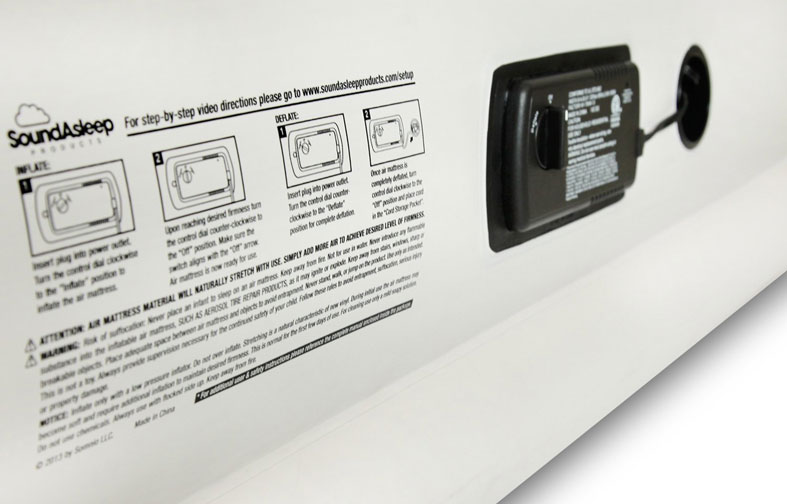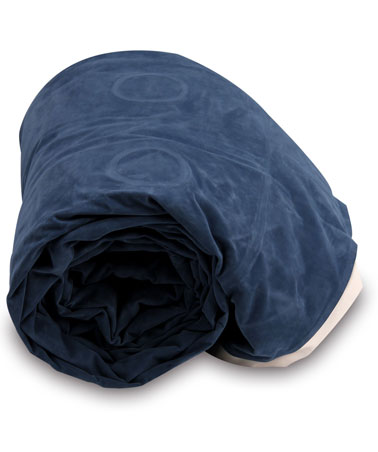Are you tired of waking up in the morning on the floor because your air mattress leaked throughout the night? Truly, inflatable air beds are one of the most comfortable options on the market, but that is in spite of the fact that they so often deflate during use.
So, exactly why does your blow-up bed lose air?
There are several reasons why this may be happening to you. We will discuss these reasons and we’ve also take it one step further by providing you with a few tips to avoid mattress deflation in the future. We want to help you get back to that good night’s sleep that you’ve been craving.
Reason 1: Improper Use
You’ve had a busy day, and it’s time for bed. The last thing you want to do is read through an entire instruction manual on how to properly inflate your bed. The problem is, if you disregard the steps that are outlined in the manual, there’s a good chance that your bed won’t operate to its optimal level of performance.
Do yourself a favor and take the time to read, understand and implement the steps that are listed; they were put there for a reason. Doing so will not only help you to maintain air pressure in your inflatable bed but will also increase the longevity of it.
Reason 2: Temperature
It’s no secret that the air during the evenings is cooler than that of air during the day. When the sun goes down, and the room temperature drops, the air inside the mattress condenses. This is due to a fancy scientific equation known as the Ideal Gas Law.
NBC Sports used this law to determine how this law affected footballs during NFL games, but the same concept applied to your air bed. During an experiment, people at Sports Science exposed balls to 10-degree temperatures for sixty minutes, and during that time the ball went from 13.5 PSI to 11 PSI.
While that’s fun an interesting fact, the point is that, when your mattress is exposed to cold temperatures during the night, it is going to lose some pressure, and thus it’ll feel deflated by the time you wake up.
Reason 3: The Pumping Predicament
In an ideal world, when you are finished filling up your mattress either with a manual pump or an electric external one, you can disconnect the pump without losing any air. Unfortunately, this is a nearly impossible task, as no blow-up mattresses on the market that utilized external pumps have been found to be completely air tight.
Being that most every inflatable bed employs an external pump to fill it with air, upon detaching the pump, a bit of air will ultimately be lost. Luckily some products have been made that use built-in pumps in consideration of this ongoing issue.
Such options are the easiest to pump up and maintain. They fill with air between four and six minutes, making it simple to set yourself our your loved ones up for the night.
Reason 4: Holes That Leak
Your air mattress is not the sturdiest product you’ll ever purchase. Often, these beds are made from a thin material that is susceptible to puncturing, stretching and rupturing eventually after continual use throughout its lifetime; you can avoid this fact.
If your bed sees a lot of daily (nightly) traffic, then the chances of the above problems surfacing increase considerably. Luckily, there are a few ways that you can avoid the inevitable wear and tear of your air bed for a while. Eventually, your mattress will succumb to its imperfections, but these tips will help you fix an air mattress leak and keep your bed alive for longer.
Tips For Increasing the Longevity of Your Air Mattress
Tip 1: Fold It With Care
Being that this is normal the last step in the processing of using this mattress, careful handling can often be overlooked. However, this is absolutely one of the most important steps and should be done with precision each time to increase the life of your blow up bed.
Over time, the stretching of the bed’s materials during the folding process will increase the likelihood of the development of tears. If minor holes are already beginning to appear, improper folding will exacerbate them and lead to increased leakage with each use.
To avoid this, be sure to follow the folding instructions that are in the user manual. These steps may seem tedious or pointless, but they are neither. They are written in the instructions to help you maintain your air mattress for as long as possible.
Tip 2: Monitor the Room Temperature
It’s important to maintain the optimal level of air inside of the mattress at all times. As previously mentioned, during cooler weather, the air in the mattress tends to condense, and the bed deflates. When the air gets low, the bed is not functioning as highly and is more prone to tears or holes.
To mitigate the chances of developing holes and tears, pay close attention to the temperature. Check the temperature at the time you’re filling up the bed, and do your best to maintain that temperature throughout the night.
Tip 3: Lay flat
Lying flat on your bed is a simple but effective way to maintain your mattress. When you sit on the ends and apply all the pressure of your body to one specific section, holes and tears may occur. By lying flat on the bed during use, your body weight is equally distributed, and thus your mattress feels less pressure and leaks less air.
Final Thoughts
The truth is, there is nothing that you can do to stop your mattress from leaking air permanently. All of these beds, no matter the cost or the materials used will eventually begin to leak, or will eventually be punctured.
Why your air mattress deflates can be attributed to many reasons. But, there are a few things we’ve outlined above that should slow down the process and add to more happy night’s sleeping on your air mattress.
Jill Zwarensteyn
Editor
About Author
Jill Zwarensteyn is the Editor for Sleep Advisor and a Certified Sleep Science Coach. She is enthusiastic about providing helpful and engaging information on all things sleep and wellness.
Combination Sleeper



